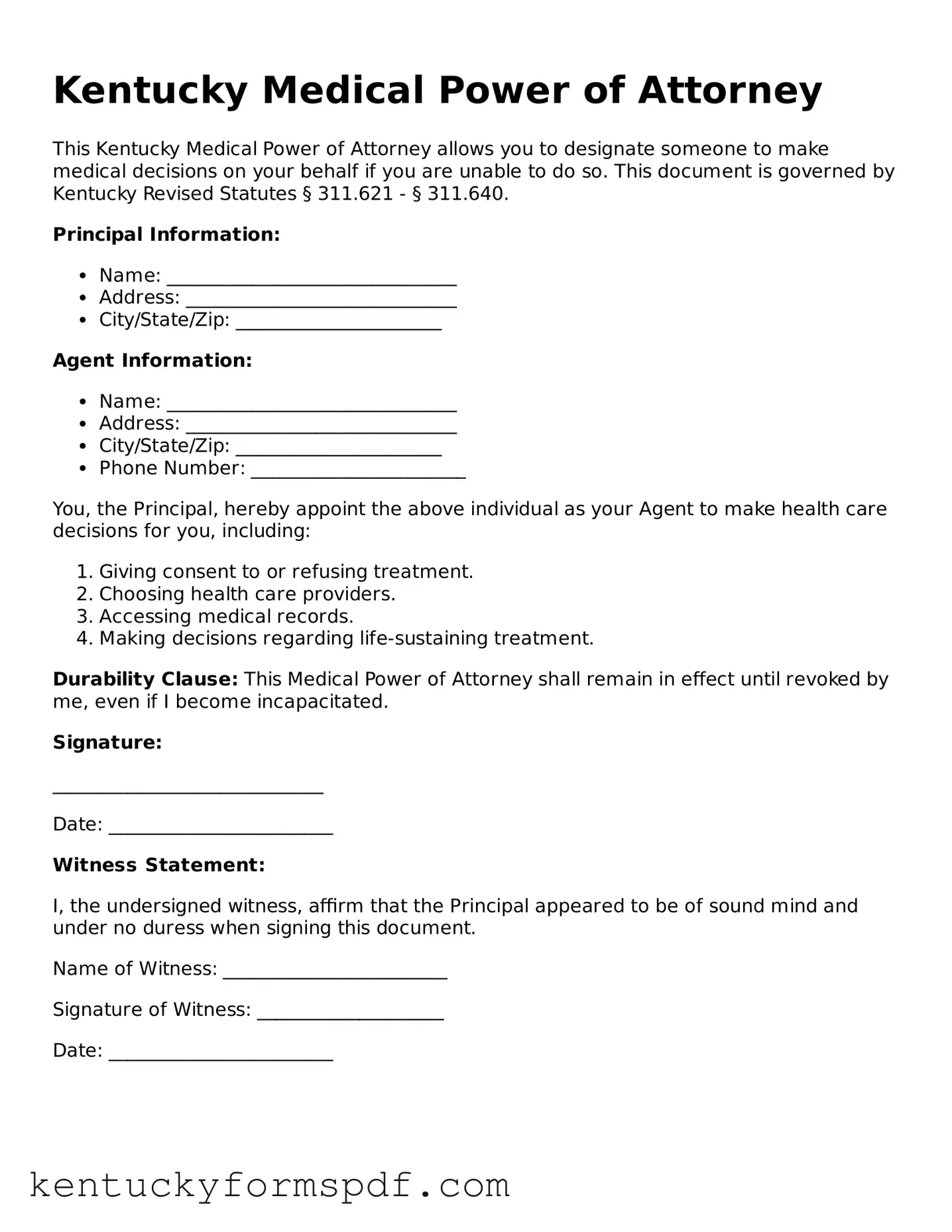What is a Kentucky Medical Power of Attorney?
A Kentucky Medical Power of Attorney is a legal document that allows you to appoint someone to make healthcare decisions on your behalf if you become unable to do so. This person, known as your agent or proxy, will have the authority to make choices about your medical treatment, including decisions about life-sustaining measures, based on your wishes or best interests.
Who can be appointed as my agent in a Medical Power of Attorney?
You can choose anyone you trust to act as your agent, as long as they are at least 18 years old and mentally competent. Many people select family members, close friends, or trusted advisors. It's important to discuss your wishes with the person you choose to ensure they are willing and able to take on this responsibility.
Do I need a lawyer to create a Medical Power of Attorney in Kentucky?
No, you do not need a lawyer to create a Medical Power of Attorney in Kentucky. However, it can be beneficial to seek legal advice to ensure the document meets all legal requirements and accurately reflects your wishes. Many resources are available online or through local organizations that can guide you through the process.
What should I include in my Medical Power of Attorney?
Your Medical Power of Attorney should clearly state your wishes regarding medical treatment and appoint your agent. It’s helpful to include specific instructions about the types of medical care you would want or not want, especially in situations like terminal illness or irreversible coma. The more detailed your instructions, the easier it will be for your agent to make decisions aligned with your values.
Can I change or revoke my Medical Power of Attorney?
Yes, you can change or revoke your Medical Power of Attorney at any time, as long as you are mentally competent. To revoke it, you can create a new document stating that the previous one is no longer valid, or you can simply inform your agent and any healthcare providers in writing. Always ensure that you provide copies of the new document to relevant parties.
Does my Medical Power of Attorney remain valid if I move to another state?
Generally, a Medical Power of Attorney created in Kentucky remains valid if you move to another state, but laws can vary significantly. It’s advisable to check the requirements of your new state to ensure your document complies with local laws. You may want to consider creating a new Medical Power of Attorney that meets the legal requirements of your new home state.
What happens if I don’t have a Medical Power of Attorney?
If you do not have a Medical Power of Attorney and become unable to make your own medical decisions, healthcare providers may need to rely on state laws to determine who can make decisions for you. This could lead to delays in treatment or decisions being made by individuals who may not know your wishes. Having a Medical Power of Attorney can help avoid confusion and ensure your preferences are respected.
Are there any specific requirements for signing a Medical Power of Attorney in Kentucky?
Yes, in Kentucky, your Medical Power of Attorney must be signed by you and witnessed by two individuals who are not related to you and do not stand to gain from your estate. Alternatively, you can have the document notarized. This helps ensure that the document is valid and reflects your true intentions.
Can I include my wishes about organ donation in my Medical Power of Attorney?
Yes, you can include your wishes regarding organ donation in your Medical Power of Attorney. It’s important to clearly express your preferences about organ donation, as this can guide your agent in making decisions that align with your values. However, you may also want to consider registering as an organ donor separately to ensure your wishes are documented in multiple places.
How can I ensure my Medical Power of Attorney is effective when needed?
To ensure your Medical Power of Attorney is effective, share copies of the document with your appointed agent, family members, and your healthcare providers. Discuss your wishes with them so they understand your preferences. It’s also wise to review and update the document periodically, especially after major life changes, to ensure it reflects your current wishes.

